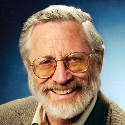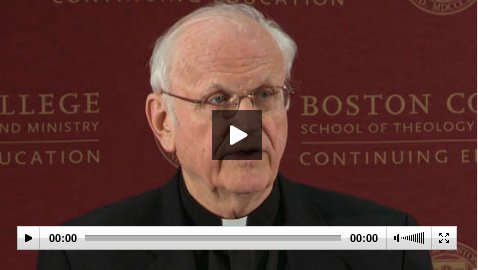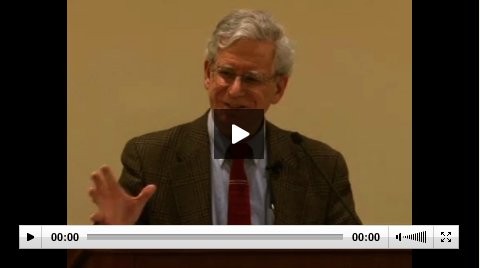Dr. Jon Levenson, the Albert A. List Professor of Jewish Studies at Harvard Divinity School, delivered this public lecture at Elon University on March 17, 2015. Levenson spoke about the commonalities and the sharp divisions between traditional Jewish, Christian, and Muslim interpretations of the episode often described as “the binding of Isaac” or “the sacrifice of Isaac.”
Torah
David Clines: Varieties of Creation in the Bible
Emeritus Professor David J.A. Clines (University of Sheffield) discusses the different ideas about Creation found in the Bible, criticising the tendency to homogenize these differences. He discusses Genesis 1, Job 38-41, Psalm 104, and various New Testament texts.
His talk was delivered at the New Directions in Cosmology Conference, St John’s College, Durham University, January 10-11, 2013, and is available both on Vimeo and as a pdf.
Genesis: Origins of the Universe and Humankind
The program title for the 73rd meeting of the Board of Governors of the Hebrew University of Jerusalem was “Genesis: Origins of the Universe and Humankind”. The meeting involved professors from various disciplines within the university, including the following offerings from biblical scholarship:
Sunday June 6, 2010
Prof. Yair Zakovitch – From Creation to History (1:19:55)
Prof. Rachel Elior – Mystical Perspectives on Creation (1:50:20)
Tuesday June 8, 2010
Prof. Nili Wazana – Forever Outsiders: The Origins of Israel According to the Bible (1:08:05)
Konrad Schmid develops a Biblical Theology of How God Acts in History
On Monday, November 17, 2014, Konrad Schmid, professor of Old Testament and ancient Judaism at the University of Zurich, delivered the Frederick Neumann Memorial Lecture. The lecture was entitled “Joseph’s Second Dream: Towards a Biblical Theology of How God Acts in History”. The lecture discusses the second dream of Joseph in Genesis 37.
The lecture is available in both video and audio mp3 formats.
John J. Collins on Early Jewish Identity
John J. Collins has delivered annual Birks Lectures at McGill University (October 2014).
The first lecture (21 October, 2014) is on ‘Torah and Jewish Identity in Second Temple Judaism’:
The second lecture (22 October, 2014) is on ‘Non-Mosaic Forms of Judaism in the Second Temple Period’:
A Literary Creation: Literary Approaches to the Book of Genesis
Bar Ilan University provides videos of papers from a conference held in June 2014: A Literary Creation: Literary Approaches to the Book of Genesis.
Introduction
How to Drive Home a Revolutionary Ideopoetics: First Impressions in Genesis – Prof. Meir Sternberg
Gayle Rubin Meets the Women of Genesis – Prof. Susan Niditch
On the Structure of the Abraham Narratives – Prof. George Savran
Genesis 26: Deep Structure and Meaning – Sarah Schwartz
“A Fugitive Aramean Was My Father” – Prof. Ed Greenstein
To Tell or Not To Tell: The Case of Jacob in Shechem – Prof. Yair Zakovitch
“Call Me Ishmael”: Melville’s Genesis – Prof. Ilana Pardes
A Common Base for Jacob’s Four Masebot – Dr. Joshua Berman
Jacob L. Wright on Aronofsky’s Noah and Flood Traditions
In the latest episode of Emory Looks at Hollywood series, Jacob L. Wright, Associate Professor of Hebrew Bible at Emory’s Candler School of Theology, discusses the various Flood traditions which lie behind and within, and which were inspired by the biblical Flood story, including one of the most recent developments in the unfolding tradition, Darren Aronofsky’s film Noah (2014).
Wright also has a short article on the same subject in Sacred Matters, “Noah: An Unrighteous Man”.
See also:
Cathleen Falsani, interview with Darren Aronofsky, “The ‘Terror’ of Noah: How Darren Aronofsky Interprets the Bible”, The Atlantic, March 26, 2014
Annette Yoshiko Reed, “Who Gets to Decide if Noah is Biblical?” Religion Despatches, April 1, 2014
h/t: Jim West
James Kugel: “Judaism: An Odd Sort of Religion of Laws”
James Kugel delivers a lecture on how Judaism got to be the way it is, a religion centrally concerned with laws, entitled “Judaism: An Odd Sort of Religion of Laws”. The lecture, delivered on on April 12, 2010, was the eighth Joseph S. Gruss Lecture and marked the Inauguration of The Tikvah Center for Law and Jewish Civilization, New York University Law School.
John Rogerson on Law and Justice in the Old Testament
Emeritus Professor John Rogerson presents the 2012 Beauchief Abbey Lent lectures at Beauchief Abbey, Sheffield: “Law & Justice in the Old Testament”. The five lectures are available as YouTube videos (the second lecture recorded in audio only).
Handouts for the five lectures may be downloaded here.
The laws of a society reflect to some extent its values and ideals. The laws in the Old Testament also do this, but there is an additional, prophetic factor, which means that Old Testament laws do not just have a regulative purpose, but also a transforming purpose. Thus, to study Old Testament laws means to study the prophetic impulse that sought to shape a society that reflected the divine image.
First Lecture:
‘What is the point of studying these things today?’
Lecture 2:
‘How should we approach the law “codes” in the Old Testament?’
Lecture 3:
‘The Covenant “Code”, Exodus 21.1-23.19’
Lecture 4:
‘The Deuteronomic “Code”, Deuteronomy 12.1-26.19‘
Final Lecture:
‘The Holiness Laws, Leviticus 19-26’
Ziony Zevit on The Fall: “Looking in on Adam and Eve in the Garden of Eden”
On November 10, 2011, Ziony Zevit delivered a lecture on the idea of “the Fall” to the Agudas Achim Congregation, Alexandria, Virginia. The lecture is available as an mp3 and on iTunes.
The idea of “the Fall” of humanity from divine grace as a result of original sin is deeply ingrained in both Jewish and Christian religious consciousness. Although the idea of the Fall is attested in Jewish writings of the first century BCE, the New Testament, and in Rabbinic texts, it is unknown in the Hebrew Bible.
This lecture looks in on Adam and Eve as they walk through the garden, eavesdrops on their reported conversations, and watches as God drives them out from Eden. Following in their footsteps, as portrayed in Genesis 2 – 4, and reading the biblical text very closely, it undertakes to respond to the following questions and discover why what we think we know is wrong: Why does the Hebrew Bible not consider what happened in the garden a Fall? Why did later thinkers come to think of what happened there as the Fall? And if not a Fall, what did happen there?
Israel Finkelstein’s Website: Including eBook, Articles, Videos, and Lectures
Israel Finkelstein, Professor of Archaeology in the Department of Archaeology and Ancient Near Eastern Civilizations, Tel Aviv University, has a very useful personal website containing resources on the Bible and Archaeology.
The site includes his eBook:
The Forgotten Kingdom: The Archaeology and History of Northern Israel, Ancient Near East Monographs 5 (Atlanta: Society of Biblical Literature, 2013).
a number of his journal articles and book chapters, for example:
“The Historical Reality behind the Genealogical Lists in 1 Chronicles“, Journal of Biblical Literature 131 (2012): 65-83.
“A Great United Monarchy? Archaeological and Historical Perspectives“, in: R.G. Kratz and H. Spieckermann eds. 2010. One God – One Cult – One Nation: Archaeological and Biblical Perspectives. Berlin (2010): 3-28.
and a number of videos and lectures, including:
The Wilderness Itineraries: Who, How and When did Biblical Authors Know About the Southern Deserts
h/t:`Jim West
Disability Studies Quarterly and Biblical Studies
Disability Studies Quarterly is an open access journal which has a number of biblical studies articles. These include:
Richard J. Clifford: “Genesis 1-11: What Do Adam and Eve Teach Us Today?”
Prof. Richard J. Clifford presents a lecture entitled, “Genesis 1-11: What Do Adam and Eve Teach Us Today?” The lecture was delivered at Boston College on March 14, 2013.
To many people today, the opening chapters of Genesis—the seven-day creation account and the stories about Adam and Eve and the flood—are merely entertaining. To ancient readers, however, the stories answered serious questions about human life. Can these stories instruct us today?
Peter Machinist: “The Problem of Myth in the Hebrew Bible”
Peter Machinist, Hancock Professor of Hebrew and Other Oriental Languages, Harvard University, delivers a lecture on “The Problem of Myth in the Hebrew Bible“, March 14, 2012, at Boston College.
The word “myth” has been used in many different ways, sometimes positively, but more often, and especially recently, negatively. Many would argue that it has no relevance for the Hebrew Bible/Old Testament; indeed would be expressly rejected by the biblical writers. But is this correct? The answer, this lecture argues, is no – that, in fact, myth is a word and a set of concepts which can lead to a deep and varied understanding of the Hebrew Bible, set against the broader ancient Near Eastern world from which it comes.
Beyond Belief: Eve
This edition of BBC Radio 4’s Beyond Belief looks at the presentation of Eve in both the Bible and its reception featuring Katie Edwards and Maureen Kendler. They are also joined by the apologist Amy Orr Ewing.
In the trailer for the final run of Desperate Housewives, viewers are seduced into watching the series with a variety of tantalising images. Four beautiful women in provocative poses, attracting the longing gazes of their easily led men. Snake like belts draped sinuously around their waists are provocatively removed or loosened. And there’s an apple, red and luscious, newly plucked from a tree. A 21st century television hit makes its appeal by drawing on an ancient biblical character which it assumes will resonate with the viewer.
Joining Ernie Rea to discuss the Biblical figure Eve, and what has been made of her down the centuries are Katie Edwards, lecturer in Biblical Studies at Sheffield University; Amy Orr Ewing, Director of the Oxford Centre for Christian Apologetics; and Maureen Kendler, head of Educational Programming at the London School of Jewish Studies.
Katie Edwards offers the angle from the perspective of critical biblical scholarship, including the use of Eve in advertising. Maureen Kendler looks at close readings of the biblical texts and provides ancient contextualisation, including how Eve compares and contrasts with Lilith.
Ernie Rea: If Eve, the original Eve, were to come into this room now, what would you say to her?
Edwards: “Blimey”, because I don’t think she ever existed in the first place
Rea: I suppose, “Put some clothes on”



